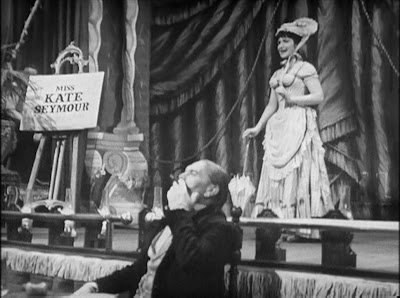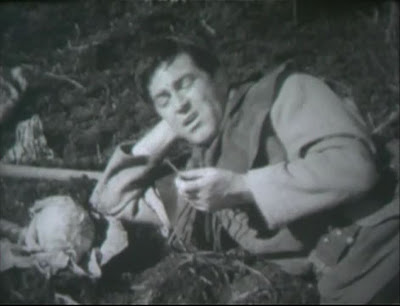It was inevitable that sooner or later there'd be an episode of Sergeant Cork set in the bawdy, gaudy world of the music hall: where The Case of the Stagedoor Johnnie scores is in spotlighting a genuine music hall star. Cicely Courtneidge is obviously a star of later vintage than the 1880s setting of Sergeant Cork, but the larger-than-life turn she contributes here nonetheless lends valuable authenticity to the episode's setting.
At Riley's music hall, we meet a pair of dashing young aristocrats, Lord George Crichton (Jeremy Longhurst, with the moustache) and the Hon. James Stratton (Michael Meacham). It's abundantly clear that they're slumming it: "This is warm," Lord Crichton complains to the waiter, indicating his Champagne. "Yes, that's right sir," comes the cheerful reply.
The act these two have come to see is not Mr Jack Daley, who just sort of walks about the stage a bit, but singing sensation Kate Seymour (Eira Heath - later a mainstay of the BBC's The Good Old Days, doing much the same act as here), to whom Jimmy Stratton has recently become engaged - much to his friend's horror.
It's not just Lord Crichton who disapproves of Jimmy and Kate's relationship. Kate's old mum Bessy (Courtneidge) isn't keen on it either. In the best tradition of showbiz mums she's living out her own unrealised dreams of stardom through her daughter, and Kate'll never be the next Marie Lloyd if she gives up performing to marry a nob.
Bessy's idea of an ideal husband for her daughter is a former suitor of Kate's, dimwitted sailor Arthur (David Burke) who she welcomes to the singer's dressing room with open arms and - going into Cockney overdrive- a glass of stout and a big bowl of winkles: "'ave some winkles - you're fond of 'em, ain'tcha?"
Kate's taste's now more refined than in her days of stepping out with Arthur and she won't be persuaded away from Jimmy, though her ardour's been cooled a tad by a series of poison pen letters she's received describing a previous relationship of her fiancé's in scandalous detail. Determined to unmask the blackguard whose trying to break up his engagement, Jimmy reports the letters to Sergeant Cork of the CID. He happens upon the eminent detective berating long-suffering elderly porter Chalky White (Freddie Fowler) in no uncertain terms about his failure to deliver adequate refreshments: "Do you realise we fight on so that you and your family can sleep safely in your beds at night, and you tell me you're too busy to make tea?" (Update on Cork's eating habits: this week he demands a toasted bun with his tea rather than the customary two digestives).
Both Cork and Bob Marriott are fans of Kate, and despite having masses of more important cases to work on, they decide to help Jimmy out by looking into the matter of the anonymous notes - the latest of which threatens violence against the young aristocrat. Cork eyes up the suspects: could jealous Arthur be the culprit? Or Lord Crichton, who holds very strong views about the mixing of different classes (except where him having a bit of fun is concerned)? Then there's Jimmy's spurned former lover Lily Brander herself: Marriott goes to see her and comes back both besotted and convinced Lily could quite easily kill Jimmy herself. Lily's charms are left to our imaginations - we catch only a brief glimpse of her as Lord Crichton hustles her out of his house, where she's been hiding behind a screen during a police visit.
Jimmy ends up savagely beaten up by Arthur, whose revealed to be quite the psycho, later carrying Kate off and threatening her with a knife.
But it's blatantly obvious to the viewer from the first who's behind the letters. Bessy Seymour isn't just determined for her daughter be a music hall star, she also nurses a grudge against the upper classes, Cicely Courtneidge's big dramatic moment coming when she angrily tells Cork about her husband's death, trampled by a horse belonging to a drunken toff who escaped justice.
Bessy eventually realises the error of her ways, and old softie Cork tells her there'll be no trouble for her as long as she leaves her daughter's relationship alone. It's a tender little scene, but I'm not sure if many members of the 19th century CID would've been quite as touchy-feely as our hero.
The episode ends with Kate leading a rousing singalong of "The Boy I Love Is Up in the Gallery". There's not a great deal of mystery to The Case of the Stagedoor Johnnie, but it's a loving portrayal of the music hall and a touching mother-daughter character study. Richard Harris's script is gloriously witty and there are some lovely guest performances, particularly from Heath and Longhurst - and especially Courtneidge, who dominates the screen every time she appears.
Finally, I don't think I've yet sufficiently praised William Gaunt as Bob Marriott. Louche, but with bursts of puppyish enthusiasm, he's absolutely adorable, and I think I'm a bit in love with him. He gets some especially wonderful moments this week: looking thoroughly bored as Cork pontificates over the class problem in Jimmy and Kate's relationship ("I thought all that went out with George IV," he later grins)...
...his reaction when Cork accepts a glass of fine old crusted Port from Lord Crichton but informs him "my assistant does not drink"...
...and, best of all, his look of abject horror on learning that the pair's next case will take them to Bradford.
But what, you may well ask, is happening in the charts this week? Well, Frank Ifield's confessing that he loves you at number 1, while at number 2 a rather less enamoured Elvis insists you're the devil in disguise. At number 3, here's the Searchers with the irresistible "Sweets for My Sweet". The full chart's here.























































